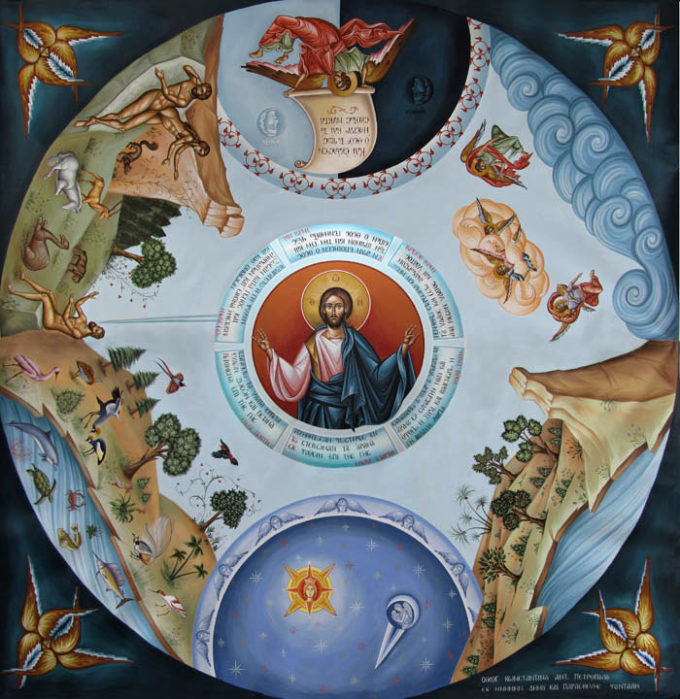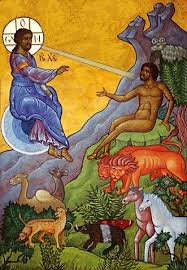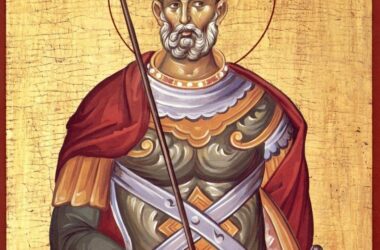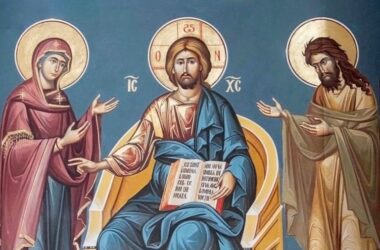The Creation of the World
(Genesis 1, 1-2,3)
The Holy Scripture on the first page refers at the creation of the world. The holy history starts with the Genesis. We have the duty to start with the same subject. It is well known to all of us the tale related in the Holy Scripture about the creation of the world. Let’s remember it briefly then give answers to the puzzlement and questions deriving from it.
So according to Genesis the first book of the Old Testament, God made the world in 6 days. What means the word day we’ll see in the following lines of this homily. On the first day God made the heaven and earth [1], meaning the material substance from which He was going to make after that all the beings and He separated the light from darkness. On the second day he made the sky, the atmosphere and He separated the waters which were on earth from the waters which were in the heights in the form of clouds. On the third day He separated the land from the sea and He made the first plants on earth. On the fourth day He made the celestial bodies, the sun, the moon and the stars. On the fifth day He created the sea animals and the flying birds. On the sixth day He made the land animals and finally He created the man. Thus after He finished His work of Creation, on the seventh day God rested and blessed this day and made it a day for rest. (Genesis 1, 1-2,3)
The story is very simple but by this simple story the Holy Scripture aims to teach us great, fundamental truths. That is why it relates facts simply with images which are familiar to people, so that these truth may be understood by all the people from all times.
Therefore the first and the most important truth it aims to show us is that God is the Creator of the world. How the world was created is one of the questions which have always preoccupied the man. So many philosophers tried to give an answer at this question by their theories. Some of them said that the world have always existed, others sustained that it had created itself and others said that it was born from chaos.
The Holy Scripture gives the only rational and natural answer: the world is neither without beginning nor was it created by itself, but was made from nothingness by God, the Only One without beginning and eternal. What exists, either be it a living being or a lifeless thing, had not always existed and it was not made aimlessly, but for a certain reason. Thus it is very logical to accept that the whole world has its Creator and this one is no other than the Omnipotent and Omniscient God. This truth is expressed by saint Paul who says: For every house is built by someone but God is the builder of everything. [2]
In the account of the Holy Scripture about the creation of the world we often read: “God said…and it was done.”
We must not imagine that God speaks as we do and gives orders and commands. Many times the Holy Scripture presents God acting like a man: thinking, walking, getting angry, changing his mind. All these expressions aim to help us feel God closer to us and to understand as much as possible His works.
Thus by saying that God said and it was done [3] it aims to show us that everything was made by God’s will. His will was enough to make everything it was made. And not only then at Genesis. God’s will is omnipotent all the time.
When God wants something to be done, that thing will be surely done, no matter how hard men will oppose to it.
However nothing can be done without the will of God, no matter how hard we’d try and strive.
Genesis talks about six days in which God had created the world and we all know this from childhood and say it. But what does it mean when the Holy Scripture says day? Day and night are created by the rotation of the Earth around the Sun and around its own axis. Genesis shows that the sun appeared in the fourth day. So how had been the days delimited before? It is clear that here the Holy Scripture does not speak about days of twenty four hours but about long time intervals. With the same meaning of time interval it is used the word day in another place as well. For instance when our Lord says: I must work the work of Him that sent me while it is day[4] – it refers at the entire length of His work on earth. Anyway for God time has no relevance: With the Lord a day is like a thousand years and a thousand years are like a day. [5] Thus when we hear about the six days of Genesis, we should not limitate the meaning of day at that one we give it today. The six days from Genesis are six huge time intervals. This does not diminish the omnipotence of God. He could have created the world just as easily even in a moment but His will was to create the world in huge time intervals. The Holy Scripture shows us this truth when it speaks about six days. This is how the Holy Fathers understood the meaning of the word day and they say that the seventh day, which started at the end of Genesis hasn’t finished yet but will continue till the end of the world. Then the seventh day will end and the eighth day will start which will never end. This will be the life of the future age, the undying day of the Kingdom of God.
After each work of Creation, the Scripture presents God looking at what He had done and making sure that it was good, perfect. “And God saw that it was good” we repeatedly read (Genesis 1, 4, 8, 10, 13, 18, 21, 25) This iteration has a relevant significance. First of all it shows us the perfection of God’s works. It would have been unconceivable that a perfect and omniscient God could have created anything else but perfect things. The man can see the perfection of God’s works searching them: the huge universe with the countless celestial bodies; the earth with the mountains and plains, the seas and rivers, the great variety of plants and animals and finally himself. This search provokes his admiration and makes him cry with David: How great are your works, oh, Lord, you have made all things in wisdom! [6] The Scripture teaches us that God, who is good, could create only a good world. His goodness made Him create the world and especially the man. Therefore His goodness wouldn’t have allowed Him to make something bad which would have made difficult the life of the beings He created, especially that of man. And if today there is evil in the world, the cause is not God, but someone else who was created by God good by nature but he chose the evil. Thus the world is not the creation of an evil god, as some ancient religions taught us but the work of the One and Only God and it was made perfect.
Natural science formulated different theories about the Genesis of the world. Some of them seem to be in contradiction with the account of the Holy Scripture.
This causes confusion for many and makes them doubt the authenticity of the Holy Scripture. But things are not that way. The Holy Scripture give answers for some questions about the genesis of the world and science gives answers for some others. The Holy Scripture is not a scientific book, it is a religious one. Its aim is not to describe scientifically for us how the world was created, but to show us who created it and for what reason. Science does not deal with these questions, it tries to explain how the world was made and studies the laws regarding its evolution and action. The scientists have formulated till nowadays different theories about the way the world was created but these theories are mere hypotheses since no one saw the genesis of the world to make an accurate description about that. For this reason each of these theories has its adepts but also its opponents. None of them was accepted by all people. However even if we accept that the world was created in a way or another, this doesn’t impede us to accept the existence of God, the Creator. No matter how the world would have been created physically, it had been created by the will and power of God. Thus it is wrong to consider that the Holy Scripture is opposed to science and that the second one cancels and rejects the first. Each one of them follows its own path and has its own aims. But nevertheless the conclusions the science draws come to testify the orderliness and the arrangement of the creation depicted in the Holy Scripture. We shall give only two examples.
The first: The Scripture says that God made light in the first day and the sun in the fourth day. So many wondered: How could be possible to have light without sun? And they rushed to conclude that the Scripture makes some gross mistakes. But science has accepted in the latest decades that the sun is not the only source of light and in the universe there is dispersed light, resembling the polar aurora which is caused by electric phenomena. Besides this, when the Scripture says that the sun was created in the fourth day, it might be possible that it only became visible then, because before that the earth had been surrounded by very dense clouds. As on a cloudy day we don’t see the sun, but its light reaches the earth, in the same way we can accept that even before the fourth day the sunlight had reached the earth but it had been dim.
The second: The Scriptures says that the plants had been created before the sun. And many considered this is unacceptable and rushed to say that Moses was wrong. But the mistake is theirs.
Recent studies showed that even without sunlight it is possible to have growing vegetation, as it happens in greenhouses. Thus there was a time when the earth was like a huge greenhouse with a lot of carbon dioxide which favored the growth of plants.
In this way there appeared twenty/twenty five meters tall trees, which were later buried by geological disturbances, they were petrified and formed the coal layers of nowadays. It is significant the fact that these plants don’t have in their stem the annual rings which are formed under the action of sunlight. Therefore it is obvious that they had existed before the sunlight appeared on earth.
These facts and many others made some great scientists accept the accuracy of the biblical account about Genesis and to say that Moses must have been as learned as the scientists of today or that what he wrote was inspired by divine revelation (Ampere, Bio) and if we wanted to present briefly the conclusions of geology about the Genesis of the world, we should relate the story from Genesis (Lapparan)
Let’s end the homily from today with some observations regarding the seventh day. The Scripture says that in the seventh day God rested from all His work [7]. We usually say that God rested on the seventh day but it is not correct. God did not tire by making the world nor did He stop working.
The Lord Himself testifies this: My Father is always at His work to this very day [8]. He rested means that he ended Creation, because the work of Creation was completed. Then God continued to work for the preservation and administration of the world because the world which had been created by the will and power of God has a permanent need of His will and power for being preserved. If God stopped even for a moment to take care of the world this would turn back to non-existence, to the nothingness from which it was created. But God’s rest from the seventh day has a special significance for us. It teaches us that we must stop our works one day a week for physical rest and for worshipping God. For the Jews this day according to the commandment of God was on Saturday. For us, for Christians it is on Sunday, the day when the world was recreated by the Resurrection of our Lord, Jesus Christ. God’s rest from Genesis prefigures another rest: the rest of the Son of God from the work of salvation which was done by His death and burial. This connection is explained by a chant from the Matins and Vespers of the Great Saturday. The day of today was secretly prefigured by Moses by saying: God blessed the seventh day cause this is the blessed Sabbath, this is the day of quiet and of rest on which the Only begotten Son of God rested from all His works, keeping Sabbath in the body, by means of the mystery of the dispensation taking effect in death, returning through Resurrection to what He had been and granting us eternal lifefor He alone is good and the lover of mankind.( from the church praises from the Great Saturday)
[1] Genesis 1,1
[2] Hebrews 3,4
[3] Psalm 32, 9
[4] John 9, 4
[5] 2 Peter 3, 8
[6] Psalm 103, 24
[7] Genesis 2,2
[8] John 5, 17






